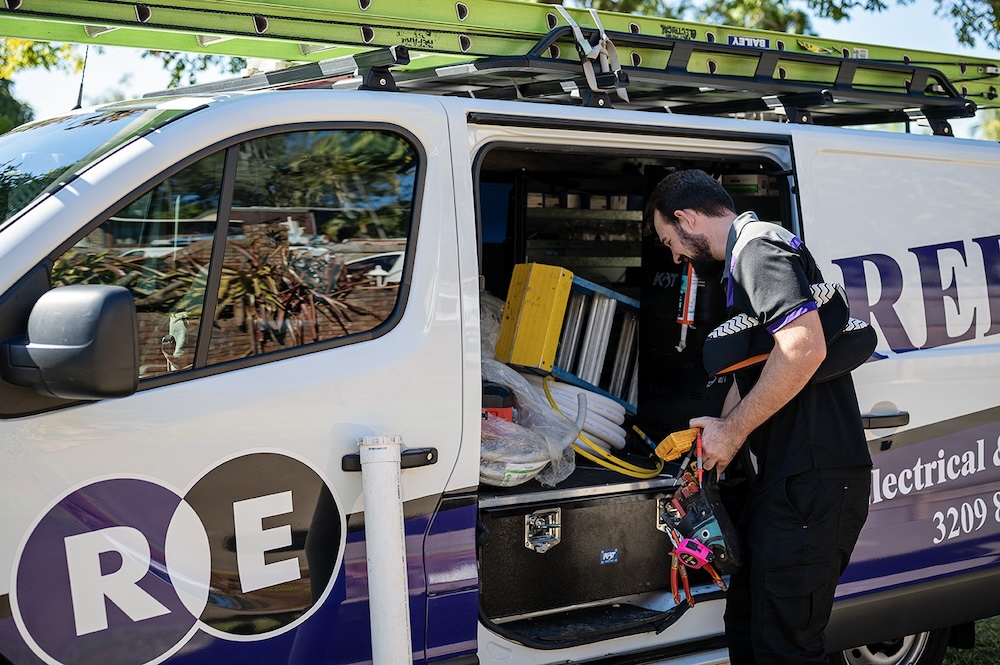Is your circuit breaker constantly tripping? It might be annoying, but it’s an unmissable sign you cannot ignore.
Understanding why this happens can save you from the inconvenience and potential hazards of electrical issues. In this blog, we’ll explore the five most common reasons why circuit breakers trip.
If you’re frequently being frustrated by a tripping circuit, contact REPARE’s electrician in Logan. We can provide professional assistance when needed. Let’s dive in!
What are 5 common reasons a circuit breaker trips?
1. Overloaded circuit
When too many devices are plugged into a circuit, it draws more current than the circuit can safely handle. This causes the breaker to trip to prevent overheating and potential fires. Distributing electrical loads evenly across circuits is crucial for both safety and functionality.
2. Short circuit
A short circuit occurs when an active wire comes into contact with a neutral or ground wire.
This creates a sudden surge of current that overwhelms the circuit, prompting the breaker to trip as a safety measure. Careful inspection is necessary to identify and rectify the wiring issue.
3. Ground fault
Residual Current Devices (RCDs) or safety switches, play a vital role in electrical safety.
Similar to a short circuit, a ground fault occurs when a hot wire contacts a ground wire or metal outlet box.
RCDs detect this fault and quickly interrupt the circuit to prevent electrical shocks.
They are essential in areas prone to moisture, such as bathrooms and kitchens, ensuring enhanced safety against electrical hazards.
4. Electrical appliance malfunction
Faulty or damaged appliances can cause a circuit breaker to trip.
Issues like frayed cords, damaged plugs, or internal faults can create electrical problems that lead to breaker trips.
Underlining the importance of regular appliance maintenance and prompt repair of any issues.
5. Ageing or faulty wiring
Over time, wiring can deteriorate. This leads to loose connections, exposed wires, or damaged insulation, which can cause circuit breakers to trip or powerpoints to stop working.
This highlights the importance of electrical inspections and upgrades to ensure the safety and reliability of your electrical system.
Electrical safety: preventing circuit breaker trips and hazards
Ensuring electrical safety in your home or workplace is crucial for preventing accidents and protecting both people and property.
Here’s how you can minimise the risk of circuit breaker trips and other electrical hazards:
Proper outlet usage
Avoid overloading outlets by plugging too many devices into the same socket.
Distribute electrical loads evenly across different outlets and circuits to prevent overloads, which can lead to breaker trips.
Regular maintenance
Frequent inspections of wiring, outlets, and appliances helps to identify emerging signs of wear or malfunction.
Addressing issues promptly with one of our expert electricians prompt can prevent circuit overloads and potential hazards.
Moisture management
Keep electrical equipment and wiring dry and away from water sources to prevent moisture-related hazards.
Install Ground Fault Circuit Interrupters (GFCIs) in areas prone to moisture, like the kitchen or bathrooms. If you’re concerned about wet power outlets, read our blog.
Professional inspections
Professional inspections can help prevent circuit breaker trips and ensure the safety of your electrical infrastructure. Our skilled team also provides specialised services and advice, such as childproofing electrical powerpoints, improving energy efficiently, and upgrading outdated electrical systems.
Our qualified electricians can assess the condition of your electrical system and identify any potential hazards.

The importance of seasonal electrical maintenance
Seasonal electrical maintenance is vital for keeping your electrical systems safe and efficient, especially in Australia’s varied climate conditions.
Regular checks and maintenance throughout the year mitigates potential hazards. This strategy arms us with insight to action issues before they grow to become more problematic!
Winter preparation
Before the arrival of winter, inspect outdoor lighting fixtures to ensure they are functioning correctly and replace any damaged bulbs.
Check for signs of wear or damage on outdoor wiring. Address any issues promptly to avoid electrical hazards during winter storms or frosty conditions.
Summer maintenance
As we head into Australia’s scorching summers, inspect and clean air conditioning units to maintain optimal performance and efficiency.
Clear any debris from around outdoor units to prevent airflow obstruction and overheating.
Regularly check for wear on electrical components and wiring to prevent breakdowns during hot weather.
Autumn clean-up
As autumn arrives, clear away leaves and debris from outdoor outlets and fixtures to minimise fire hazards and potential electrical problems.
Inspect outdoor electrical outlets for signs of damage or deterioration, particularly in regions prone to bushfires, and address any issues promptly.
Spring inspection
In spring, inspect outdoor lighting fixtures for any damage or wear.
Replace any faulty bulbs and ensure wiring is secure and undamaged. Test safety switches to ensure they are functioning correctly, especially in areas prone to heavy rainfall or flooding.
Remember to prioritise safety and always seek assistance from our qualified electricians for any electrical tasks.
Tripping circuit breaker? Get the right diagnosis and fix with REPARE
If your circuit breaker keeps tripping, it’s essential to get a proper diagnosis and effective solution.
Book an appointment with our experienced team at REPARE Electrical & Air Conditioning today! Our friendly team is ready to assist you with expert advice and reliable services.Simply give us a call at (07) 3209 8006 or enquire online.